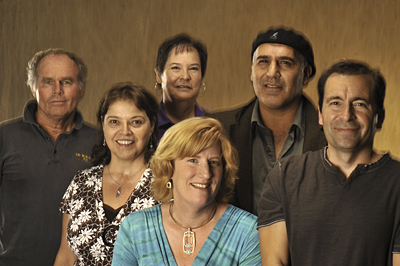
Dick Greene, left, Ester OFearghail, Belinda Laumbach, Carol Linder, Mario Gonzales and Gil Gallegos will present lectue series during this year’s homecoming week.
Las Vegas, N.M. — New Mexico Highlands University presents a faculty lecture series on a wide variety of topics Oct. 4 — 5 during homecoming week. The lectures are free and open to the public.
The Oct. 4 lectures include:
Belinda Laumbach, Ph.D., education professor, presents on “The Latest Middle School Drama: New Common Core State Standards and Research” at 10 a.m., Margaret Kennedy Alumni Hall, 905 University Ave.
“The middle school stage of human development includes cognitive, emotional and physical change unlike any other time of life and yet these years have largely been ignored by policy makers,” Laumbach said. “We know from research that this age takes specific instructional methods, techniques and strategies.
“To help address this unmet need, I secured a grant called Students and Teaching Achieving Through Research Based Strategies that is being implemented through our School of Professional Development in the School of Education. The timing of this new initiative is especially critical given the new Common Core State Standards,” Laumbach said.
Mario Gonzales, Ph.D., cultural anthropology professor, presents on “From New Mexico to New Delhi: the Globalization Culture of Immigration” at 11 a.m., Margaret Kennedy Alumni Hall.
“My talk will focus on the positive economic impacts that immigrants have globally, with emphasis on my research on circular immigration — a loop where people participate in two cultures and contribute economically to both,” Gonzales said. “For example, immigrants from Oaxaca, Mexico contribute as agricultural workers to Oregon’s economy while sending money home to Mexico that benefits their families and the local economy.
“I also want to introduce the idea of giving more work visas to scientists, such as chemists and engineers, who are highly beneficial to the U.S. both economically and scientifically,” Gonzales said.
Gil Gallegos, Ph.D., computer science professor, presents on “Terrestrial Robots Utilizing Imbedded Systems for 3-D Vision” at 1:30 p.m., Margaret Kennedy Alumni Hall.
“An issue with autonomous terrestrial rovers is their ability to do path finding and path planning on their own,” Gallegos said. “We’re utilizing off-the-shelf hardware and open-source software to program 3-D vision for the rovers in real time in unknown environments such as the terrain of Mars.
“Since 2009, I’ve been part of a collaborative robotics research project at Sandia National Labs on this subject. In April, Sandia loaned a large rover to Highlands for our research, giving our computer science students the opportunity to learn about modern embedded system design,” Gallegos said.
The Oct. 5 lectures include:
Dick Greene, Ph.D., engineering and biology professor, presents on “Human Cardiovascular System and Aging: When Does the System Go South?” at 10 a.m., Student Center, 2nd floor student senate chambers, 903 Baca Ave.
“The efficiency of the human cardiovascular system to transport oxygen and glucose to cells deteriorates, regardless of your genetic template, lifestyle, behavior, environment and other factors,” Greene said. “New technology that I’ve helped develop through my research, such as cardiovascular ultrasound, makes it possible now to gather data on healthy individuals across age groups without using invasive techniques.
“The good news is that this new methodology and technology show that if you age successfully, you can maintain healthy cardiovascular function into your 70s. The data is pretty compelling,” Greene said.
Carol Linder, Ph.D., biology professor, presents on “Using Mouse Genetics to Understand Male Infertility” at 11 a.m. in Ilfeld Auditorium, 900 University Ave.
“The genes in mice are virtually identical to genes in humans, and I research the mouse genes that regulate sperm development using two different models of mouse infertility,” Linder said. “With funds from several grants, I’m studying the disrupted metabolic pathway in infertile mice that will help us better understand human male infertility.
“As a developmental biologist, the mouse testes give me a perfect model for research because undifferentiated stem cells from one organ develop into a specialized, unique sperm cell. I currently have 10 students doing research in my lab, which is important to me,” Linder said.
Ester OFearghail, M.F.A, M.A., art history professor, presents on “Georgia O’Keeffe Country: Are We There Yet?” at 1:30 p.m., Margaret Kennedy Alumni Hall.
“We know that Georgia O’Keeffe had a special relationship with the natural landscape of Northern New Mexico, and my talk focuses on under what circumstances art can frame our interaction with the environment,” OFearghail said. “As an art historian, the well-known phrase Georgia O’Keeffe Country is a rich research topic because it speaks to so many cultural phenomenon, such as spirituality, geography and a sense of place, economics and language.”
